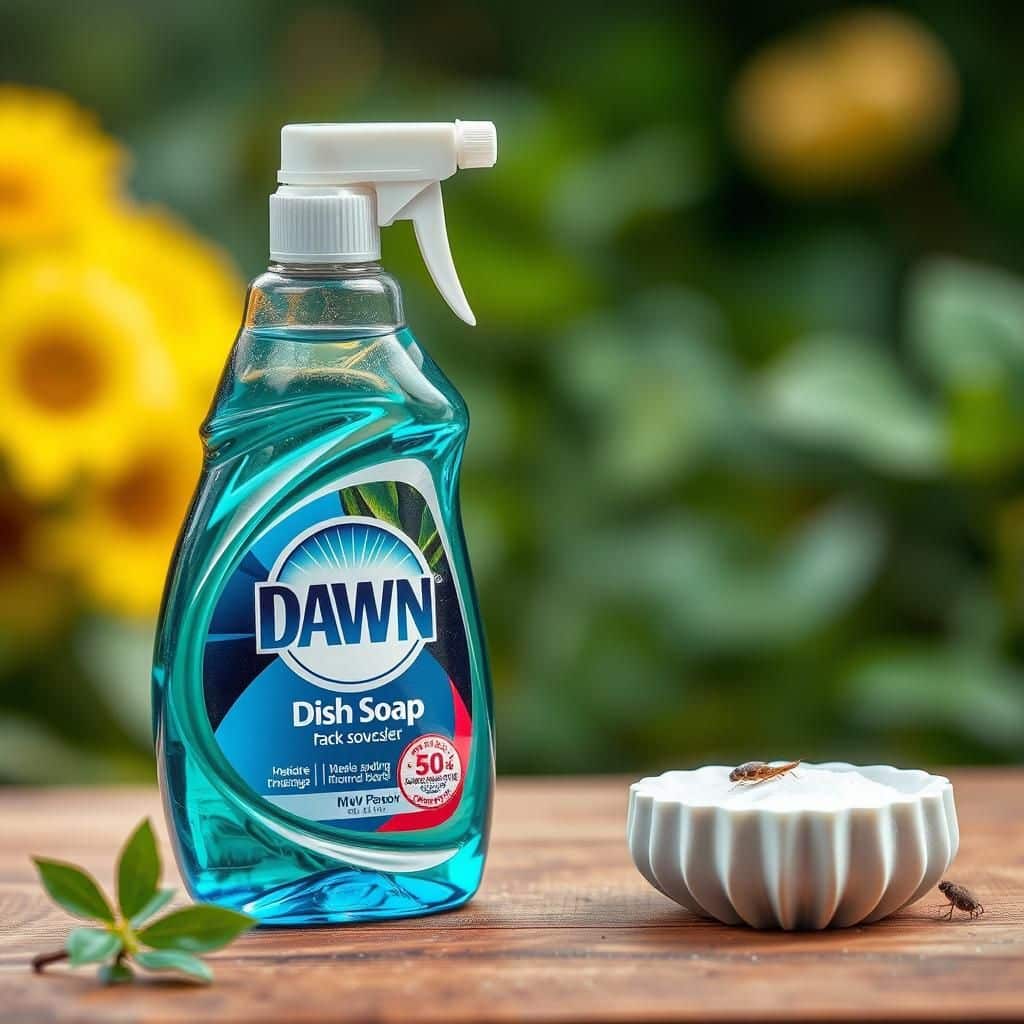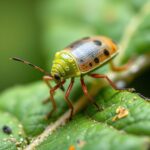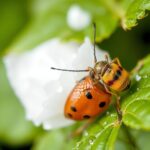Will Dawn Dish Soap Kill Aphids? Discover the Truth and Effective Solutions

Aphids are a common pest that can wreak havoc on gardens and houseplants, leading many gardeners to seek effective and safe solutions for their control. One often-discussed remedy is Dawn dish soap, praised for its grease-cutting properties and perceived insecticidal effects. But does it really work against aphids? In this article, we will explore the truth behind using Dawn dish soap, examining its effectiveness, safety, and the best practices for application. By understanding how this household product interacts with aphids, you can make informed decisions for pest management in your green spaces. Discover effective solutions for tackling these pesky invaders.
Will Dawn Dish Soap Effectively Kill Aphids?
Using Dawn dish soap can be an effective method to control aphids, as it works by suffocating these pests and disrupting their cellular membranes. When diluted with water and applied to infested plants, the soap can penetrate the waxy coating of the aphids, leading to their demise. Additionally, it is generally considered safe for the plants when used in appropriate concentrations, making it a popular choice among gardeners looking for a natural pest control solution. However, the effectiveness can vary depending on the concentration of soap used and the degree of infestation, so regular monitoring and reapplication may be necessary for the best results.
How Does Dawn Dish Soap Kill Aphids?
Dawn dish soap kills aphids primarily through its surfactants, which reduce the surface tension of water and allow the solution to spread and adhere to the pests. When applied directly, the soap penetrates the aphids' protective coatings, causing them to dehydrate or suffocate. This method is favored because it is non-toxic to plants compared to harsher chemicals, and it can target a variety of soft-bodied insects, making it a versatile option in integrated pest management.
Is Dawn Dish Soap Safe for Plants?
Dawn dish soap is generally considered safe for most plants, but it is crucial to dilute it properly, typically around 1-2% concentration (1-2 tablespoons of soap per gallon of water). This ensures that the solution is effective against aphids while minimizing the risk of leaf burn or damage to the plant's delicate tissues. It's advisable to conduct a patch test on a small area of the plant before widespread application to ensure that no adverse reactions occur.
How to Prepare a Dawn Soap Solution for Aphids?
To prepare a Dawn soap solution for aphids, mix 1-2 tablespoons of the soap with one gallon of water in a spray bottle or garden sprayer. Shake the mixture gently to combine, ensuring that the soap is evenly distributed in the water. For optimal results, thoroughly spray the affected parts of the plant, including the undersides of leaves where aphids tend to congregate. Avoid applying during the hottest part of the day to reduce the risk of plant stress.
See also:
How Often Should You Apply Dawn Dish Soap for Aphids?
The frequency of application largely depends on the severity of the aphid infestation. Typically, it is recommended to spray the soap solution every 5-7 days until the aphid population is under control. After initial treatments, it may be necessary to monitor the plants and continue applications as needed, especially if new aphids appear. Regular inspections can help in maintaining effective pest control while minimizing harm to beneficial insects.
Are There Any Alternatives to Dawn Dish Soap for Aphid Control?
Yes, there are several alternatives to Dawn dish soap for aphid control. Insecticidal soaps and oils, neem oil, and garlic or chili spray are also effective against aphids. Moreover, introducing natural predators, such as ladybugs or lacewings, can help control aphid populations without using chemical treatments. Each alternative has its own application methods and safety considerations, so it may be beneficial to research and choose the method that best fits your gardening style and plant needs.
| Method | Effectiveness | Safety for Plants |
|---|---|---|
| Dawn Dish Soap | Effective | Generally Safe |
| Insecticidal Soap | Highly Effective | Safe |
| Neem Oil | Effective | Safe |
| Garlic/Chili Spray | Moderately Effective | Generally Safe |
| Beneficial Insects | Effective | Safe |
Understanding the Effectiveness of Dawn Dish Soap Against Aphids
The effectiveness of Dawn Dish Soap in eliminating aphids largely stems from its surfactant properties which disrupt the protective outer layer of these pests, ultimately leading to their dehydration and death. When diluted and applied properly as a spray, it can target aphids without significantly harming the surrounding plants or beneficial insects if used judiciously. However, it is essential to understand that while Dawn can act as a helpful deterrent and may reduce aphid populations, it is not a holistic solution. A more integrated approach, including the use of natural predators and maintaining proper plant health, is recommended for long-term management.
How to Properly Dilute Dawn Dish Soap for Aphid Control
To effectively use Dawn Dish Soap as an aphid control solution, it is crucial to properly dilute it to avoid damaging your plants. A common ratio is to mix 1-2 tablespoons of Dawn in a spray bottle filled with water, ensuring that you achieve a consistent mix. Test the solution on a small section of the plant first, as different plants may react differently to soap solutions. The diluted mixture should be applied directly to the aphids, focusing on the undersides of leaves where they tend to hide.
Potential Risks of Using Dawn Dish Soap on Plants
While Dawn Dish Soap is relatively safe for many garden plants, there are some risks involved in its application. High concentrations or unnecessary frequent applications can lead to phytotoxicity, which manifests as leaf burn or other damage. Additionally, while it may kill aphids, it can also affect beneficial insects like ladybugs and bees if they come into contact with the soap. Always monitor your plants after application for any adverse effects, and consider spot treating instead of widespread spraying.
See also:
Alternatives to Dawn Dish Soap for Aphid Management
If you are looking for alternatives to Dawn Dish Soap for managing aphid populations, consider options such as neem oil, insecticidal soaps, or introducing natural predators like ladybugs and lacewings. Neem oil not only combats aphids but also provides a repellent effect against other pests. Insecticidal soaps that are specifically formulated for garden use can be more effective and safer for plants compared to household dish soaps when used according to the manufacturer's instructions.
Timing and Frequency of Application
The timing and frequency of applying Dawn Dish Soap can significantly impact its effectiveness. It is best to apply the soap solution in the early morning or late afternoon to avoid intense sunlight, which can cause leaf burn. Repeat applications may be necessary, especially after heavy rainfall or if you notice a resurgence of aphid populations. Generally, a weekly application during the peak of aphid activity can help manage and reduce infestations.
Recognizing Signs of Aphid Infestation
Recognizing the signs of an aphid infestation is crucial for timely intervention. Look for clusters of small, often green or black insects on the undersides of leaves and at the tips of new growth. Additionally, check for sticky honeydew on surfaces below infested plants, which attracts ants and can encourage the growth of sooty mold. If you notice any of these signs, it may be time to formulate a management plan that includes measures like using Dawn Dish Soap or other pest control strategies.
Questions from Our Readers
Will Dawn dish soap effectively kill aphids?
Yes, Dawn dish soap can effectively kill aphids when used as an insecticidal soap. The soap works by suffocating the aphids and disrupting their cell membranes, making it difficult for them to thrive. However, it's important to apply it correctly to achieve the best results.
How do I apply Dawn dish soap to get rid of aphids?
To apply Dawn dish soap, you should dilute it with water, typically using a ratio of about 1-2 tablespoons of soap per quart of water. Spray the solution directly onto the aphids and their infested plants, ensuring thorough coverage for maximum effectiveness.
See also:
Is Dawn dish soap safe for all plants?
While Dawn dish soap can be safe for many plants, some sensitive varieties may experience leaf burn or other adverse effects. It's recommended to test the solution on a small area of the plant before widespread application to ensure it does not cause any damage.
How often can I use Dawn dish soap on plants?
You can use Dawn dish soap on your plants every 7 to 14 days until the aphid problem is under control. Be sure to monitor the plants for any signs of stress or damage after application, and adjust the frequency as needed.

If you want to read more articles like Will Dawn Dish Soap Kill Aphids? Discover the Truth and Effective Solutions, we recommend you check out our Insects category.
Leave a Reply
Related Articles